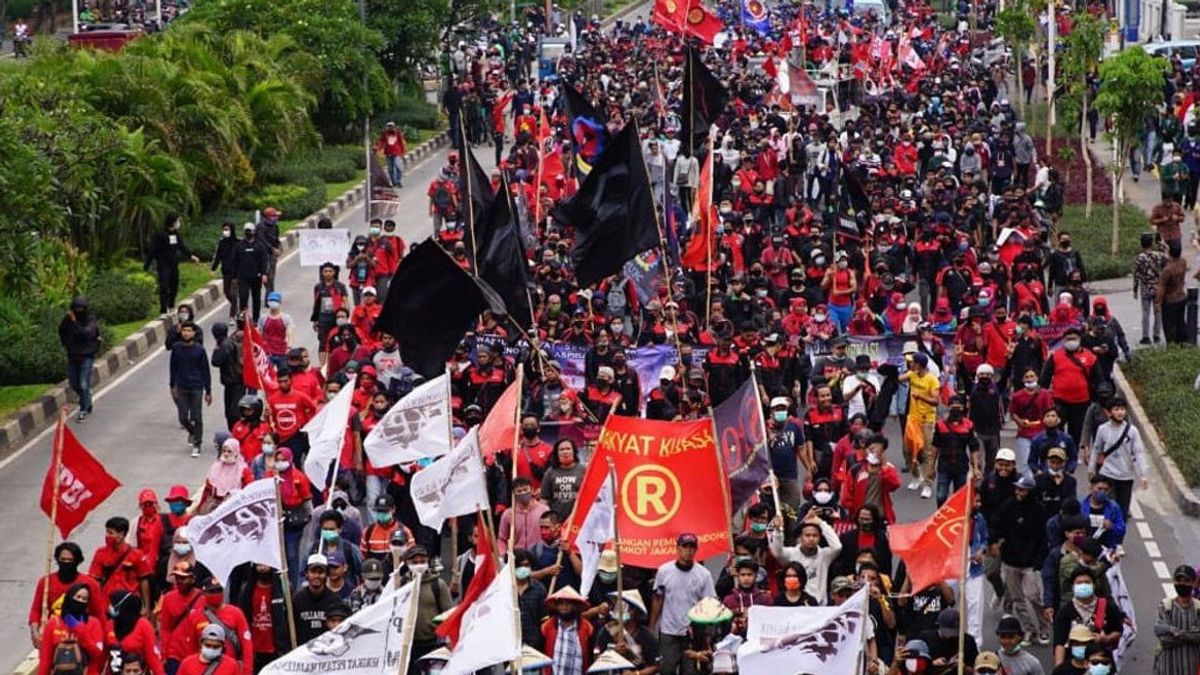JAKARTA - Chairman of the Confederation of Indonesian Workers Unions (KSPI), Said Iqbal, denied the narrative of the government and the DPR which stated that the issue of reducing workers' rights in the Job Creation Law was a hoax.
This issue is widely discussed on social media, the government and the DPR are busy stating that the issue is not true. President Joko Widodo also spoke about the hoax issue in his speech.
In fact, said Said Iqbal, workers were indeed disadvantaged by a number of articles in the Job Creation Law which was passed on October 5.
"Don't call it a hoax first. Because, we joined the Omnibus Law drafting team, then built communication with members of the DPR Legislative Body and the government. We also verify the issues circulating on social media. That's our basis for our opinion. So, it's not a hoax," Said Iqbal in a webinar discussion, Monday, October 12.
Said Iqbal teased the Coordinating Minister for the Economy Airlangga Hartato and the Minister of Manpower Ida Fauziyah for asking the public to read comprehensively about the draft of the Job Creation Law. In fact, so far the government has not been transparent in publishing official drafts.
"The minister always says, read first. What do you read? The draft is unclear. From 905 pages it changed to 1,028 pages, changed again to 1,052, now it has changed again to the last 1,035 pages. People are fooled by the government's rhetoric asking people to read. very dangerous, "said Said Iqbal.,"
At least, there are four crucial issues that are detrimental to workers in the Job Creation Law, ranging from issues regarding minimum wages, regarding employee contract status, job loss guarantees, and reduction of severance pay.
Abolition of minimum wages
The government said that the UMP, UMK, and UMSP were not deleted. Said Iqbal confirmed that the minimum wage was not abolished. However, based on the copy of the draft held by KSPI, the Job Creation Law only regulates the provincial minimum wage (UMP) and the conditional regency / city minimum wage (UMK).
In the Job Creation Law, it is written that the governor is obliged to set the provincial minimum wage. The governor can also set the district / city minimum wage with certain conditions.
This is different from Law Number 3 of 2003 concerning Manpower which also regulates the District / City Sectoral Minimum Wage (UMSK). This "conditional" phrase is the basis for the resistance of the workers.
"If you say there is still a UMK, what kind of UMK? What workers reject is the words 'conditional'. We don't know that. In other words, we ask to return it to the Manpower Law," said Said Iqbal.
[/ read_more]
Lifetime contract employee
Said Iqbal refuted the narrative that an employee's potential can be made into a life-long contract is incorrect. The potential is still there.
In the Manpower Act, the work contract limit is set in several years. If the job is considered good, then the worker must be appointed as a permanent employee or an indefinite work agreement (PKWTT). Meanwhile, in the Job Creation Law, the time limit is not regulated.
"What is meant by fellow workers is that there is a potential for permanent employee disappearance because there is no time limit for the contract. As a result, there is no permanent employee appointment. The government should not explain in half," he explained.
Job loss guarantee
The government's argument is that job loss guarantees (JKP) can be obtained for one year of work. According to Said Iqbal, there is a possibility that this could be circumvented by the company.
"Because there is no deadline for the contract, the company can make a 6 month or 11 month contract, then break the contract, the important thing is not up to 1 year. That means the company does not need to pay JKP," he said.
[/ read_more]
Reduced severance pay
The government says that severance pay is not removed, only reduced. In the Manpower Law, the severance pay scheme is 32 months of wages, then in the Job Creation Law it is changed to 25 months of wages, with details of 19 months of wages being paid by the employer, and 6 months of being paid by the government BPJS Ketenagakerjaan.
Iqbal estimates that BPJS will not be able to finance the 6-month severance pay scheme. Because, according to him, currently the BPJS is experiencing a deficit. When there is a deficit, the government takes a solution to increase the BPJS contribution.
"When the BPJS contribution is increased, of course the workers will refuse. How come workers pay severance pay for themselves? So, return the severance pay scheme as in the Manpower Law, don't erase it," he added.
[/ read_more]
The English, Chinese, Japanese, Arabic, and French versions are automatically generated by the AI. So there may still be inaccuracies in translating, please always see Indonesian as our main language. (system supported by DigitalSiber.id)








